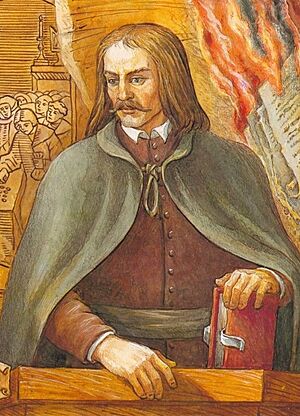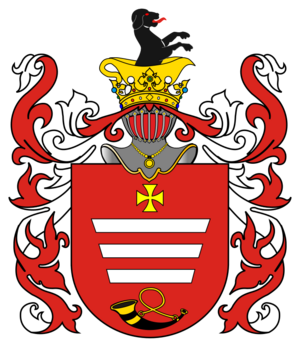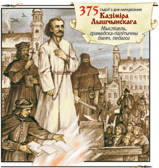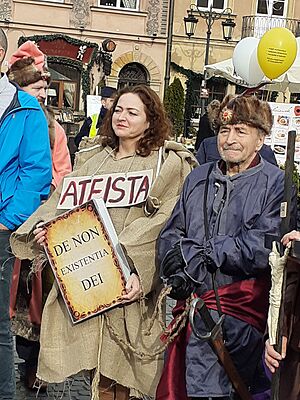Kazimierz Łyszczyński facts for kids
Quick facts for kids
Kazimierz Łyszczyński
|
|
|---|---|
 |
|
| Born | 4 March 1634 Łyszczyce, Brest, Polish–Lithuanian Commonwealth
|
| Died | 30 March 1689 (aged 55) Warsaw, Polish–Lithuanian Commonwealth
|
| Cause of death | Execution |
| Nationality | Polish |
| Other names | Casimir Liszinski |
|
Notable work
|
On the non-existence of God |
| Era | Age of Enlightenment |
| Region |
|
|
Main interests
|
Religious skepticism |
|
Notable ideas
|
Atheism in Poland |
|
Influences
|
|
|
Influenced
|
|
Kazimierz Łyszczyński (born March 4, 1634 – died March 30, 1689) was a Polish nobleman, philosopher, and soldier. He is known for being accused and executed for atheism in 1689. His case is often seen as a sad example of religious persecution in Poland's history.
Kazimierz studied philosophy for eight years with the Jesuits. After leaving the order, he became a judge. He wrote a book called On the Non-Existence of God. This book led to his trial and execution.
Contents
Kazimierz Łyszczyński's Life
Early Life and Work
Kazimierz Łyszczyński was born in Łyszczyce, a place now in Belarus. He was a nobleman, meaning he came from an important family and owned land. He was also a philosopher, someone who thinks deeply about life and knowledge.
He studied philosophy with the Jesuits for eight years. Later, he worked as a judge, handling legal cases. He was also a member of the Sejm, which was like the parliament of Poland.
Kazimierz read a book by Henry Aldsted that tried to prove God's existence. However, Kazimierz found many confusing parts in it. He wrote in the book's margins, "ergo non-est Deus" which means "therefore God does not exist."
The Accusation and Trial
One of Kazimierz's debtors, Jan Kazimierz Brzoska, found these notes. Brzoska owed Kazimierz a lot of money. Instead of paying, he accused Kazimierz of being an atheist. He showed Kazimierz's notes to a bishop named Witwicki. Brzoska also stole a handwritten copy of Kazimierz's book, De non-existentia Dei. This book was the first Polish philosophical work that looked at the world from an atheist point of view.
Bishops Witwicki and Załuski eagerly took on the case. King John III Sobieski tried to help Kazimierz. He ordered that Kazimierz should be judged in Vilnius. However, the clergy, or church leaders, still had a lot of power.
Kazimierz was arrested even before he was found guilty, which was against the law for nobles. His case went before the parliament in 1689. He was accused of denying God's existence and speaking badly about the Virgin Mary and saints. He was found guilty and sentenced to death for atheism.
Execution
Kazimierz Łyszczyński was executed in the Old Town Market Place in Warsaw. This happened on March 30, 1689.
De non-existentia Dei
Kazimierz Łyszczyński wrote a book called De non-existentia Dei, which means On the Non-Existence of God. In this book, he argued that God does not exist. He also wrote that religions are ideas created by people.
The parliament ordered his book to be destroyed. However, some parts of it were saved because they were read out during his trial. These parts show his ideas:
- He questioned how theologians could talk about God when they gave God qualities that seemed to contradict each other.
- He suggested that humans create the idea of God. He believed God is not a real being but an idea that exists only in our minds.
- He thought that religion was made up by people who weren't religious themselves. They did this to gain power and be worshipped. He believed that the fear of God was spread by those who weren't afraid, so others would fear them.
- He felt that simple people were tricked by cleverer people using the idea of God. This was done to control them.
- He also argued that there is no clear reason or proof within us that shows divine revelation is true. If it were true, everyone would believe it without doubt. He pointed out that different religions exist, and some wise people deny revelation.
During his trial, Kazimierz said that his book was meant to be a debate. He claimed it would show a Catholic winning against an atheist. He said he only wrote the atheist's part and stopped writing on a priest's advice.
Kazimierz Łyszczyński Today
In modern Poland, especially during the communist era, Kazimierz Łyszczyński became known as a hero for atheists. A philosopher named Andrzej Nowicki wrote about him. Nowicki said that Kazimierz was one of the most brilliant Polish thinkers of his time. He praised Kazimierz's wide knowledge and bold ideas.
However, not much is truly known about Kazimierz Łyszczyński. Most of what we know comes from notes taken during his trial. His importance as a symbol for atheists has led to many writings about him. People wonder what his full ideas were, since his book was destroyed.
In March 2014, Kazimierz Łyszczyński's story was part of a public event. His execution was even reenacted during a procession of atheists in Poland.
See also
- Enlightenment in Poland
- History of philosophy in Poland
- Irreligion in Poland
- Religion in Lithuania
- Religion in Belarus
- Religion in Poland
 | James B. Knighten |
 | Azellia White |
 | Willa Brown |




